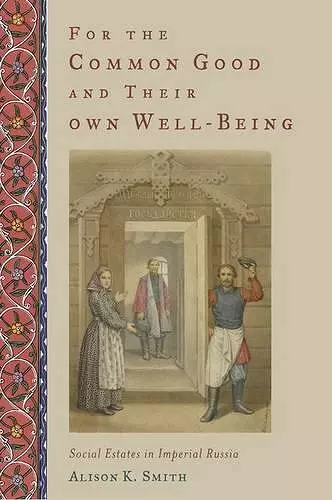For the Common Good and Their Own Well-Being
Social Estates in Imperial Russia
Format:Hardback
Publisher:Oxford University Press Inc
Published:11th Dec '14
Currently unavailable, and unfortunately no date known when it will be back
This hardback is available in another edition too:
- Paperback£22.99(9780190939625)

Every subject of the Russian Empire had an official, legal place in society marked by his or her social estate, or soslovie. These sosloviia (noble, peasant, merchant, and many others) were usually inherited, and defined the rights, opportunities, and duties of those who possessed them. They were also usually associated with membership in a specific geographically defined society in a particular town or village. Moreover, although laws increasingly insisted that every subject of the empire possess a soslovie "for the common good and their own well-being," they also allowed individuals to change their soslovie by following a particular bureaucratic procedure. The process of changing soslovie brought together three sets of actors: the individuals who wished to change their opportunities or duties, or who at times had change forced upon them; local societies, which wished to control who belonged to them; and the central, imperial state, which wished above all to ensure that every one of its subjects had a place, and therefore a status. This book looks at the many ways that soslovie could affect individual lives and have meaning, then traces the legislation and administration of soslovie from the early eighteenth through to the early twentieth century. This period saw a shift from soslovie as above all a means of extracting duties or taxes, to an understanding of soslovie as instead a means of providing services and ensuring security. The book ends with an examination of the way that a change in soslovie could affect not just an individual's biography, but the future of his or her entire family. The result is a new image of soslovie as both a general and a very specific identity, and as one that had persistent meaning, for the Imperial statue, for local authorities, or for individual subjects, even through 1917.
Smith clearly demonstrates that the soslovie system remained at once both vital and obsolete. * Steven L. Hoch, Canadian-American Slavic Studies *
The resulting work does not so much recast our understanding of imperial Russia as greatly enrich and deepen it... [E]xpansive treatment. * Valerie A. Kivelson, Slavic Review *
this [the book] will surely stand as a landmark in the field, just as it will spur others on to further exploration of the meanings of Russian social boundaries. * Simon Dixon, Slavonic and East European Review *
Researchers and advanced students of Russian history will undoubtedly find this a useful study * J. Zimmerman, CHOICE *
Smith's study is a dense and ambitious examination of the meaning of the social order in Russia, built, from the ground up, of individual experiences rather than from a top-down consideration of the legal system ... subtle, but important, revisions to our understanding of the Russian government, where authorities relied upon the engagement of the public at all levels to forge its modern state. * Matthew P. Romaniello, English Historical Review *
Alison Smith's book can provide a good entry point for historians in other fields to get a hands-on feel for Russian society and its fluidity and successfully controverts tired stereotypes of absolutism, social rigidity, and backwardness. It is a serious, archivally driven investigation of hundreds of specific cases of individuals changing soslovie * Journal of Modern History *
ISBN: 9780199978175
Dimensions: 165mm x 236mm x 31mm
Weight: 522g
296 pages